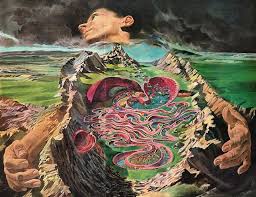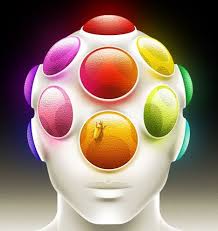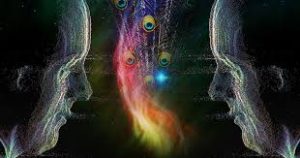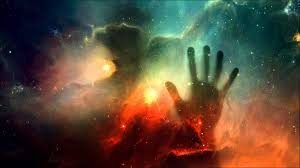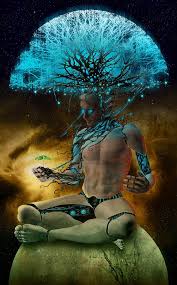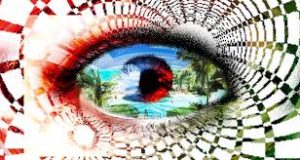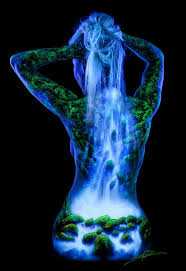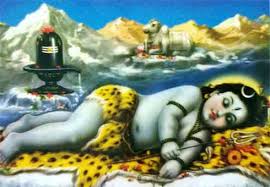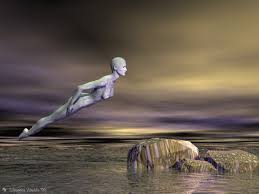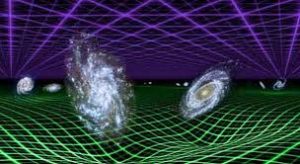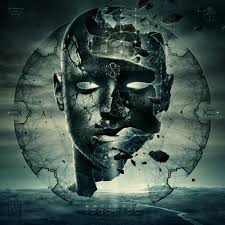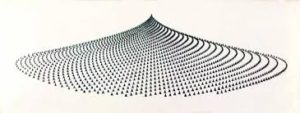We will sometimes automatically translate this reality into physical terms. Such images will be hallucinatory, but it may take awhile for us to distinguish their true nature. It must be understood, however, that all physical objects are hallucinatory. They may be called mass hallucination.
There is constant translation of inner reality into objects in the waking state and a constant translation of ideas into pseudo-objects in the dream state. Within a certain range of dream reality, ideas and thoughts can be translated into pseudo-objects and transported. This is what happens when we adopt a pseudo-form in projection, though I am simplifying this considerably.
When we travel beyond a certain range of intensities, even pseudo-objects must vanish. They exist in a cluster about, and connected to, our own system. The lack of these, obviously, means that we have gone beyond our own camouflage system. If it were possible, we would then travel through a range of intensities in which no camouflage of the next system. This would or would not encounter the heart of the camouflage area. The completely un-camouflaged areas at the outer edges of the various systems should remind us of the undifferentiated areas between various life cycles in the subconscious. This is no coincidence.
As a rule, we see, there is little communication within the un-camouflaged areas. They act as boundaries, even while they represent the basic stuff of which all camouflage is composed. (Without the camouflage, we would perceive nothing with the physical senses.)
The sentence is really meaningless, however, because the physical senses are themselves camouflage. There would be nothing to translate. It is only the inner senses that will allow us to perceive under these circumstances. Theoretically, if we can bridge the gap between our system and another.
Once more: The undifferentiated layers are composed of the vitality that forms the camouflage of all systems. Such an area is not really a thing in itself, but a portion of vitality that contains no camouflage, and is therefore unrecognizable to those within any given system. We are in touch with infinity in such areas, since it is only camouflage that gives us the conception of time.
Now, during some projections, we may be aware of nothing as far as surroundings are concerned. There will only be the mobility of our own consciousness. If this occurs, we will be traveling through such an un-camouflaged area. We could then expect to encounter next a more differentiated environment, that seems to become clearer as we progress toward the heart of another system.
The completely un-camouflaged layer would be rather bewildering. We might automatically be tempered to project images into it. They would not take, so to speak, but would appear and disappear with great rapidity. This is a silent area. thoughts would not be perceived here, as a rule, for the symbols for them would not be understood.
If a certain intensity is reached, however — a peak of intensity — then we would perceive the spacious present as it exists within our native system. We could, from this peak, look into other systems, but we would not understand what we perceived, not having the proper root assumptions. I have used the idea of neighboring systems for simplicity’s sake, as if they were laid out end to end. Obviously, such is not the case. The systems of reality are more like the various segments of a tangerine, with the un-camouflaged boundary areas like the white membrane between the tangerine sections.
The tangerine, then, would be compared to a group of many systems, yet it would represent in itself but one portion of an unperceived whole. The tangerine would be but one segment of a larger system. We can see, then, why some projections would lead us in a far different direction from our linear sort of travel and why time as we know it would be meaningless.
Nor do such projections necessarily involve journeys through space as we know it. There are systems, vivid in intensity, that have no existence in physical reality at all. It is now thought, I believe, that time and space are basically one, but they are both a part of something else. They are merely the camouflage patterns by which we perceive reality. Space as we perceive it in the dream state comes much closer to the reality.
Projections within our own system will, of course, involve us with some kind of camouflage. If none is present, we will know we are out of the system. The dream universe is obviously closely connected with our own, since pseudo-objects are present. Even there, we are to some extent free from the space-time elements of our own system. Within the dream state, then, we are in the ‘outward’ areas of the physically oriented universe.
One point: There are other systems all about and within our own. The undifferentiated areas move out like spirals, through all reality. Little resistance is encountered with them. They represent inner roads that connect systems, as well as divide them. The traveler must leave his or her own camouflage.
It is possible, theoretically, to travel to any system in this manner and bypass others, you see. Such a traveler would not age physically. His or her body would be in a suspended state. Only a very few individuals have traveled in this manner. Most of the knowledge gained escape the ego, and the experience cannot be translated by the physical brain.
However, it is possible to travel under such circumstances, and some of the data would be retained by inner portions of the self. In a creative individual, some of this information might be symbolically expressed in a painting or other work of art.
Each brushstroke of a painting represents concentrated experience and compressed perceptions. In a good painting, these almost explode when perceived by the lively consciousness of another. The observer is washed over by the intensities. The excellent work of art recreates for the observer inner experience of his or her own, also, of which he or she has never been aware. As we know, paintings have motion, yet the painting itself does not move. This idea should help understand experience in terms of intensities and projections or the movement of consciousness without necessarily motion through space.
True motion has nothing to do with space. The only real motion is that of the traveling consciousness.
These dimensions as we know it, and I believe that in them we exercise abilities that are ours by right and heritage.
